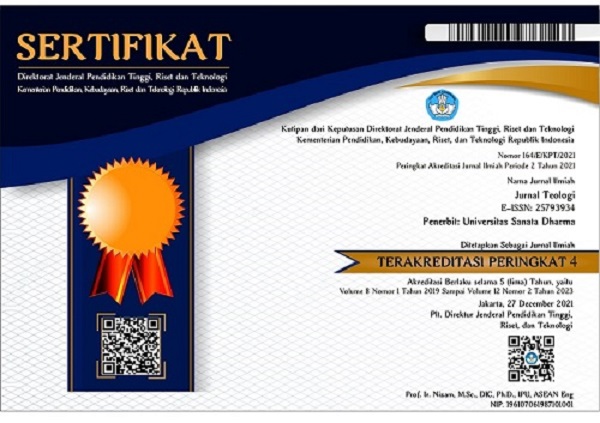The Fundamental Criterion of Liturgical Translation: Valde Utilis Apud Populum
(1) Sanata Dharma University
(*) Corresponding Author
Abstract
Liturgiam Authenticam, the instruction on the use of vernacular languages in the publication of the books of the Roman liturgy, claims to be faithful to the intentions of the liturgical reform of Vatican II, especially to the intention of Sacrosanctum Concilium 36. From the time of the publication of Liturgiam Authenticam, the debates on the liturgical translation have become tangled in the argument of authority or procedural collaboration between Rome and the Bishops Conference. The publication of the Apostolic Letter Magnum Principium in 2017 has solved this legal problem. This paper argues that the problem of implementing faithfully the intentions of the liturgical reform of the Vatican II regarding the use of vernacular in the liturgy cannot be simplified by implementing only the correct idea of collaboration between the authorities involved in the work of translation. Further, implementation of the correct understanding of the function of language in the work of liturgical translation is a serious challenge. For this reason, there are some important points to consider regarding Liturgiam Authenticam after the publication of Magnum Principium.
Keywords
Full Text:
PDFDOI: https://doi.org/10.24071/jt.v8i1.1748
Refbacks
- There are currently no refbacks.

This work is licensed under a Creative Commons Attribution-ShareAlike 4.0 International License.
.jpg)
Indexed and abstracted in:
P-ISSN: 2302 - 5476 (Validity starting Volume 2012-10-05)
E-ISSN: 2579 - 3934 (Validity starting Volume 6, No. 1, Mei 2017)
Jurnal Teologi (Journal of Theology) by Faculty of Theology Sanata Dharma University

This work is licensed under a Creative Commons Attribution-ShareAlike 4.0 International License.














